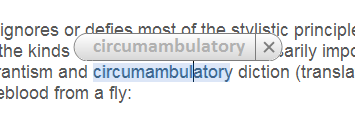Ginger proofreads Helen Sword’s Stylish Academic Writing
All eight “mistakes” identified by Ginger are false positives (i.e., there isn’t a single true mistake).
Two “mistakes” that Ginger noted were the US spelling of “favor” and “analyze,” which it tried to correct to British English, despite the fact that we had changed the setting to the US dialect.
Ginger suggested capitalizing the word “always” which follows a colon and begins a series of phrasing that further explain the information given in the main clause. While the capitalization of the first word following a colon is not grammatically correct, it is in fact the convention when making use of APA and Chicago referencing styles.
“Circumambulatory” (which is an adjective that refers to either a subject or object of circumambulation, or to the act of ritualistically walking around a sacred object) was not recognized by Ginger and so it was marked it as an error. Ginger could not suggest a replacement for this word, leaving it for the user to manually add it to their dictionary.
Ginger also thought that instead of using the phrase “higher education research journals,” we should refer to “higher education” and “research journals” as two independent entities separated by a comma:
It wanted us to place a comma before the conjunction “but,” as you would if you were using UK English (remember, we set the checker to US English!):
The tool failed to recognize that “abstract,” in the sentence below, functions as an adjective (not a noun requiring an article), and it again wanted to change the meaning by splitting the phrase “abstract, convoluted sentences” into two independent elements:
Finally, while Ginger had no problem recognizing the archaic pronoun “thou,” it did have trouble recognizing the archaic “thy” occurring in the exact same sentence, which it wanted to correct to “the”:
Text used in the experiment: Sword, Helen. (2012). “Rules of Engagement,” in Stylish Academic Writing. Cumberland: Harvard University Press.







